新编实用英语综合教程2第四版
新编实用英语综合教程(第四版)Unit 2教案

江西外语外贸职业学院教案备课纸(2)江西外语外贸职业学院教案备课纸(3)主任审阅____________________ 授课教师____________________ 年月日年月日江西外语外贸职业学院教案备课纸(4)授课内容Unit 2Section I Talking Face to FaceThe topic of talking face to face area in this unit is to express thanks and give responses while exchanging gift-card and congratulation card. The focus is on the patterns that are appropriate for giving information concerning the various reasons and hoping to get the forgiveness from the other person.1. The students read the mini-talks after the teacher, and then try to recite them within five minutes in pairs.2. Ask the students to underline the useful expressions and perform the mini-talks in class.3. The students discuss in groups, summarizing the words, phrases and sentences frequently used according to the following topics with the help of the teacher. The students speak out the sentences under the guidance of the teacher, paying attention to the pronunciation and the intonation.1) sentences frequently used for expressing thanks:It was so generous of you to send me such a fine and beautiful gift.I don’t know how to express my thanks to you.I’m grateful for all the help and encouragement you’ve given me.2) Sentences frequently used for expressing congratulations:Congratulations on your recent promotion!Please accept my heartiest congratulations.江西外语外贸职业学院教案备课纸(3)主任审阅____________________ 授课教师____________________ 年月日年月日江西外语外贸职业学院教案备课纸(4)授课内容Unit 2Section Ⅱ Being All Ears1. Give the students a few minutes to read through the printed materials for each listening item.2. Listen to the material for the first time without referring to the book.3. Listen to the material for a second time, and ask the students to answer the following questions orally.1) What is the relationship between Andy and Donna?2) What happened to Donna? How does she feel now?3) Why does Donna show her thanks to Andy?4) Where does Andy get the flowers?5) Where does Donna keep the flowers?江西外语外贸职业学院教案备课纸(3)主任审阅____________________ 授课教师____________________ 年月日年月日江西外语外贸职业学院教案备课纸(4)授课内容Section Ⅲ Trying Y our HandApplied WritingSample AnalysisThe teacher summarizes briefly the format and language used in thank-you notes, congratulation cards and apology letters. The teacher may show the following passage with PPT. Afterwards, ask the students to read it and translate it into Chinese orally. 1.More information about thank-you notes;Thank-you notes are usually exchanged between friends and acquaintances. They are brief, direct and often in an informal style. They are often written in simple languages, using courteous words and sentences to express the writer’s good wish or thanks. The following sentences are often used in thank-you notes.2.More information about congratulation cards:People often write and send a congratulation card to congratulate one on such joyful occasions as celebrating one’s promotion, wedding, birthday, graduation, etc. Congratulation cards are also exchanged on holidays. The language used in a congratulation card usually sounds courteous and complimentary. The following expressions and sentences often appear in congratulation cards.Grammar3.Assignment for this sectionWritten work: suppose you missed an appointment with your friend. Please write a letter of apology for his/her forgiveness.江西外语外贸职业学院教案备课纸(3)主任审阅____________________ 授课教师____________________ 年月日年月日江西外语外贸职业学院教案备课纸(4)授课内容Unit 2Section Ⅳ(1): Passage 1 Thank you, Volunteers!rmation Traditional Festivals in China.春节:Spring Festival ( the 1st day of the 1st lunar month)除夕:New Year’s Eve ( the day before the Spring Festival)元宵节:Lantern Festival ( the 15th of the 1st lunar month)清明节:Qingming/Tomb-Sweeping Festival (April 4th or 5th)端午节:Dragon Boat Festival( the 5the of the 5th lunar month)七夕节:Qixi Festival( the 7th day of the 7the month of the lunar month, somewhat equivalent to Valentine’s Day in English)中秋节:Mid-Autumn Festival( the 15th of the 8th lunar month)重阳节:Double-Ninth Day ( the 9th of the 9th lunar month)2.Important Traditional Festivals in Western Countries.圣诞节:Christmas( the 25th of December)平安夜: Christmas Eve ( the 24th of December)情人节:Valentine’s Day ( 14th of February)愚人节:Fool’s Day ( the 1st of April)复活节:Easter( the 1st Sunday after a full moon on or after 21st of Marth)感恩节:Thanksgiving Day ( the 4th Thursday f November)万圣节:Halloween/All Saints’ Day (31st of October)Important words1.offerv. make available or accessible, provide or furnishe.g. The conference center offers a health spa.The local student offers to guide us around the city.2. invitev. ask someone in a friendly way to do somethinge.g. Shall we invite the famous football player to join our club?Students are invited to submit papers to this online magazine.3. gratefula. feeling or showing thankse.g. He felt so grateful to all the strangers’ help.We need to feel more grateful for what we have instead of complaining what we don’t.4.breakn. a pause from doing something ( as work)e.g. The meeting was too long, so we had a tea break.A 10-minute break between each session offers us a time to rest a bit.5. appreciatev. be fully aware of;; realize fullye.g. Do you appreciate the full meaning of this letter?I do appreciate what you have done to ease my pain.6. recognizev. show approval or appreciation ofe.g. Our effort is fully recognized by the society.The in-service training center is widely recognized here.江西外语外贸职业学院教案备课纸(3)主任审阅____________________ 授课教师____________________ 年月日年月日江西外语外贸职业学院教案备课纸(4)授课内容Unit 2Section Ⅳ(2): Passage 1 Thank you, Volunteers!Language pointsExplanation of Difficult Sentences1. (Para. 1)November in the United States brings the holiday of Thanksgiving, and therefore it’s in November that we tend to think of a way in which we could show our thanks to volunteers.Analysis: This is a complex sentence. The basic sentence structure is S(subject) and S in which…In the second and-clause an emphatic structure it’s inNovember is used to emphasize the time adverbial of in November,modifying we tend to think. Which leads a relative clause, modifyinga way.Translation: 因此,我们在十一月里常常会想办法来表示对志愿者们的感谢。
新编实用英语综合教程2第四版UnitTwoCommunicationbyEmail

Use concise language
Avoid using complex vocabulary and sentence structures, and try to express ideas in concise and clear language so that the recipient can quickly understand.
Elements of an email system
01
Email server
A dedicated computer responsible for receiving, storing, and
forwarding emails, and is a core component of the email system.
02
Email client
a software interface for users to interact with email servers,
used for writing, sending, receiving, and managing emails.
03
Email protocol
Reasonable layout
Properly layout the main content, such as using paragraphs, headings, lists, etc., to make the email more readable and understandable.
• Marketing and promotion: Email is also widely used in marketing and promotional activities. Enterprises can attract potential customers and promote sales by sending email advertisements, promotional information, and press releases.
新编实用英语2第四版Unit-five-Food-Culture资料讲解

Back
Unit | Five
2 Listen again to the above sentences rearranged in sequence, and then match them with their Chinese translation.
b i j g c a e h d f
But I haven’t got a menu yet
I would like to try some Western food I’d like to have a roast beef, a vegetable salad and French Fries
A glass of beer, please What do you have for dessert
Handling a Dialogue
Understanding a Short Speech / Talk
Unit | Five
1 Listen to ten topic-related sentences for workplace communication and try to remember them.
Back
Unit | Five
3 A menu is offered for customers to order food or drinks at restaurant or bars. Now let’s look at the following menu of a restaurant and try to use the information in it in your face-to-face talks.
1 JJiimm,, KKiimm,, TToomm and his friend are waiting for 2 bbrreeaakkfafasst,t,lulunncchh,,ssuuppppeerr in a restaurant. They have been waiting for a long time since they ordered their meal. Kim is 3 aannggrryy,, wwoorrrriieedd,, ssoorrrryy and complains that the service is really 4 bbaadd,, hhaarrdd,, ssllooww . But his friend thinks that they needn’t be in a 5 aannggeerr,, hhuunnggeerr,,hhuurrrryy , because the 6 wwaaititeerr,,wwaaititrreessss,,bboossss is very busy.
新编实用英语2第四版Unit-five-Food-Culture资料讲解

Steven: Sure. Let me ppoouurr it for you. Say when. Zhang: Thank you. That’s enough.
倒出 (液体)
Steven: OK. Help yourself to more meat if you want.
5) Let me pay the bill / check.
Li Ming: Let me pay the bill today.
Tom: Oh, no! Let’s ggooDDuuttcchh . We’re both students after all. AA制 (各付各的账) Li Ming: OK. It’s 15 dollars altogether. So 7 dollars and 50 cents
each. Right? Tom: That’s right. Waiter, bring the bill, please.
Back
Unit | Five
2 Work in pairs and perform the tasks by following the above mini-talks. Refer to the Data Bank in the Workbook for relevant expressions.
Unit | Five
3) I’d like something typically Chinese.
Window on Key Words
Waiter: Hello, Madam. May I help you?
Jenny: Yes. I’d like something typically Chinese.
新编实用英语2第四版Unit one Invitation Etiquette
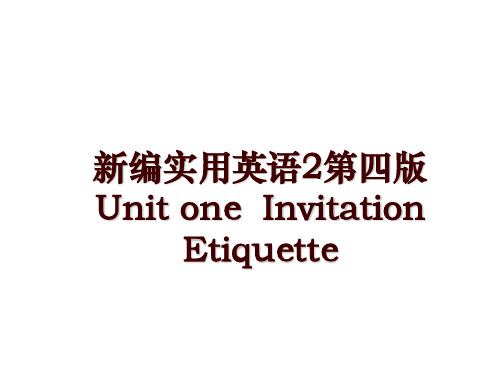
Unit Goals
Talking Face to Face
Being All Ears
Maintaining a Sharp Eye
Trying Your Hand
Warm-up Questions:
What are the two cards you are reading now?
Questions for the first invitation card:
Being All Ears
Maintaining a Sharp Eye
Trying Your Hand
Sample 1
Inviting Friends to a Party
Wang: Hello, William. What are you doing tomorrow evening? William: Tomorrow evening? Nothing special, I was thinking of watching TV. Wang: Drag yourself away from television for a change. I’m having a few friends to have a dinner party tomorrow to celebrate my daughter’s birthday. How would you like to join us?
Maintaining a Sharp Eye
Trying Your Hand
Unit Goals
1.What Students Should Learn to Do:
a. Making an oral invitation: Inviting people to join in daily activities Inviting people to formal occasions b. Making a written invitation: Writing an invitation card or a letter for: Personal invitations Official invitations c. Giving a reply to: An oral invitation A written invitation
新编实用英语综合教程2第四版汉译英答案
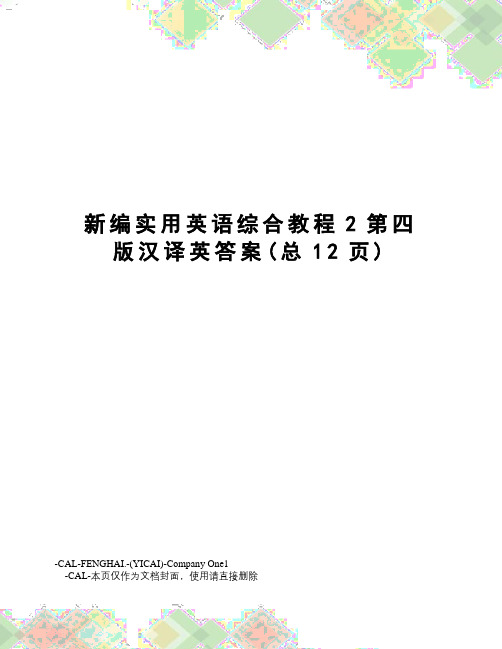
新编实用英语综合教程2第四版汉译英答案(总12页)-CAL-FENGHAI.-(YICAI)-Company One1-CAL-本页仅作为文档封面,使用请直接删除新编实用英语综合教程2第四版汉译英答案Unit 1P141) 你能告诉我在哪儿可以买到口香糖吗Can you tell me where I can buy some chewing gum2) 警察想知道她长什么样儿。
The police wanted to know what she looked like.3) 你知道她穿的是什么衣服吗Do you know what she was wearing4) 在报告中他们问到银行里有几个监控摄像头。
In the report, they asked how many security cameras there were in the bank.5) 面试官问他已经工作几年了。
The interviewer asked him how many years he had worked.6) 你想知道他什么时候去上海吗Do you want to know when he will leave for Shanghai7) 我只是想知道你喜欢什么颜色, 红色还是黄色。
I want to know which color you prefer — red or yellow.填空题1) What’s your guideline in choosing songs for your audience2) The seminar starts on Friday and the experts will be discussing the impact of tech nology on the climate in the future.3) Barclays appointed Bob Diamond, the head of its investment-banking business, as its new chief executive from March 2011.4) Frankly speaking, I cannot uphold such conduct. You see, it is aimed only at the pe rsonal interest.5) However, just because you can write statements in purely mathematical notations , this doesn’t mean that you necessarily should.6) That was good timing because his work was influential in shaping the project plan.7) Those studying abroad will most likely return home for better employment becau se of the tight job market abroad.8) It gives me great pleasure to express once again my deep appreciation for the gra nd reception and generous hospitality we enjoy here.P19Unit 2P381)你需要的是更多的锻炼。
新编实用英语综合教程2第四版-精品PPT课件
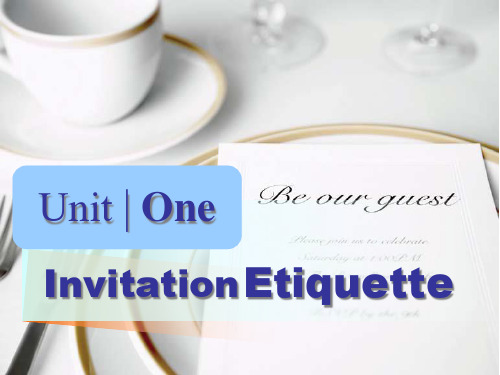
Putting Language to Use
Speak and Complete Speak and Translate Speak and Communicate
Unit | One
SECTION I Talking Face to Face
Imitating Mini-talks
Speak and Recite
2) Inviting friends to a dinner Mary: We’d love to have you over for dinner Saturday.
Robert: Oh, thank you. What time should I come? Mary: How about eight o’clock?
Being All Ears
Section Ⅲ
Contents
Section Ⅴ
Appreciating Culture Tips
Section Ⅳ
Maintaining a Sharp Eye
Trying Your Hand
Unit | One
Section I Talking Face to Face
really special. Cindy: Oh, thanks, but ... maybe some other time. I’m very busy tonight.
Window on Key Words
好极了
祝贺
滑旱冰
Back
Unit | One
Acting out the Tasks
Unit | One Invitation Etiquette
Unit | One
Unit Goals:
新编实用英语综合教程2第四版Unit-two--Communication-by-email(课堂PPT)

Li Li: Really? What does it say?
Paul: New slang has been invented in recent years by students, especially as they
get access to the Internet and chat online.
4 Task: Discuss some slang words used in emails.
5 Task: Talk about the meaning of a new slang you’ve come across in your e-mail messages.
● Refer to the Data Bank in the Workbook for more relevant expressions.
Unit | Two
1 Unit | Two
Unit Goals:
What You Should Learn to Do
1. Chat online 2. Us e abbreviations and slangs in communicating online 3. Write an e-mail
Li Hong: Oh, really. I remember I once ran into “TTYL” while chatting with somebody online.
Let me have a guess. Does it mean “talk to you later”?
Back
Mike: That’s right. You are really smart.
Mike: Chatting online.
新编实用英语综合教程(第四版)Unit-2教案
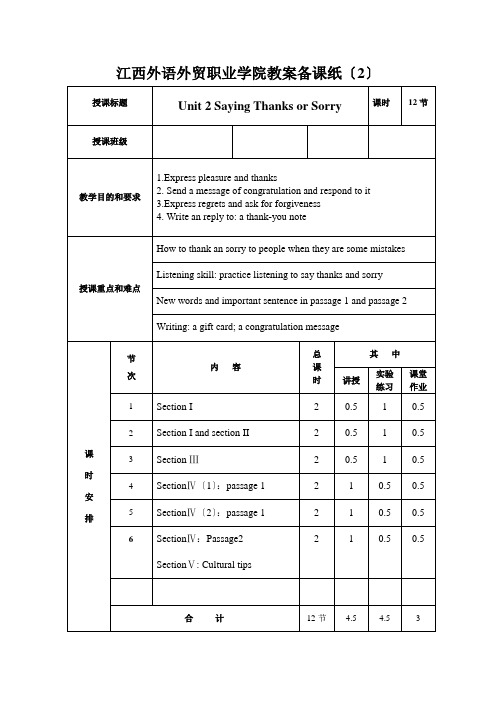
江西外语外贸职业学院教案备课纸〔2〕江西外语外贸职业学院教案备课纸〔3〕主任审阅____________________ 授课教师____________________ 年月日年月日江西外语外贸职业学院教案备课纸〔4〕授课内容Unit 2Section I Talking Face to FaceThe topic of talking face to face area in this unit is to express thanks and give responses while exchanging gift-card and congratulation card. The focus is on the patterns that are appropriate for giving information concerning the various reasons and hoping to get the forgiveness from the other person.1. The students read the mini-talks after the teacher, and then try to recite them within five minutes in pairs.2. Ask the students to underline the useful expressions and perform the mini-talks in class.3. The students discuss in groups, summarizing the words, phrases and sentences frequently used according to the following topics with the help of the teacher. The students speak out the sentences under the guidance of the teacher, paying attention to the pronunciation and the intonation.1) sentences frequently used for expressing thanks:It was so generous of you to send me such a fine and beautiful gift.I don’t know how to express my thanks to you.I’m grateful for all the help and encouragement you’ve given me.2) Sentences frequently used for expressing congratulations:Congratulations on your recent promotion!Please accept my heartiest congratulations.江西外语外贸职业学院教案备课纸〔3〕主任审阅____________________ 授课教师____________________ 年月日年月日江西外语外贸职业学院教案备课纸〔4〕授课内容Unit 2Section Ⅱ Being All Ears1. Give the students a few minutes to read through the printed materials for each listening item.2. Listen to the material for the first time without referring to the book.3. Listen to the material for a second time, and ask the students to answer the following questions orally.1) What is the relationship between Andy and Donna?2) What happened to Donna? How does she feel now?3) Why does Donna show her thanks to Andy?4) Where does Andy get the flowers?5) Where does Donna keep the flowers?江西外语外贸职业学院教案备课纸〔3〕主任审阅____________________ 授课教师____________________ 年月日年月日江西外语外贸职业学院教案备课纸〔4〕授课内容Section Ⅲ Trying Y our HandApplied WritingSample AnalysisThe teacher summarizes briefly the format and language used in thank-you notes, congratulation cards and apology letters. The teacher may show the following passage with PPT. Afterwards, ask the students to read it and translate it into Chinese orally. 1.More information about thank-you notes;Thank-you notes are usually exchanged between friends and acquaintances. They are brief, direct and often in an informal style. They are often written in simple languages, using courteous words and sentences to express the writer’s good wish or thanks. The following sentences are often used in thank-you notes.2.More information about congratulation cards:People often write and send a congratulation card to congratulate one on such joyful occasions as celebrating one’s promotion, wedding, birthday, graduation, etc. Congratulation cards are also exchanged on holidays. The language used in a congratulation card usually sounds courteous and complimentary. The following expressions and sentences often appear in congratulation cards.Grammar3.Assignment for this sectionWritten work: suppose you missed an appointment with your friend. Please write a letter of apology for his/her forgiveness.江西外语外贸职业学院教案备课纸〔3〕主任审阅____________________ 授课教师____________________ 年月日年月日江西外语外贸职业学院教案备课纸〔4〕授课内容Unit 2Section Ⅳ(1): Passage 1 Thank you, Volunteers!rmation Traditional Festivals in China.春节:Spring Festival ( the 1st day of the 1st lunar month)除夕:New Year’s Eve ( the day before the Spring Festival)元宵节:Lantern Festival ( the 15th of the 1st lunar month)清明节:Qingming/Tomb-Sweeping Festival (April 4th or 5th)端午节:Dragon Boat Festival( the 5the of the 5th lunar month)七夕节:Qixi Festival( the 7th day of the 7the month of the lunar month, somewhat equivalent to Valentine’s Day in English)中秋节:Mid-Autumn Festival( the 15th of the 8th lunar month)重阳节:Double-Ninth Day ( the 9th of the 9th lunar month)2.Important Traditional Festivals in Western Countries.圣诞节:Christmas( the 25th of December)平安夜: Christmas Eve ( the 24th of December)情人节:Valentine’s Day ( 14th of February)愚人节:Fool’s Day ( the 1st of April)复活节:Easter( the 1st Sunday after a full moon on or after 21st of Marth)感恩节:Thanksgiving Day ( the 4th Thursday f November)万圣节:Halloween/All Saints’ Day (31st of October)Important words1.offerv. make available or accessible, provide or furnishe.g. The conference center offers a health spa.The local student offers to guide us around the city.2. invitev. ask someone in a friendly way to do somethinge.g. Shall we invite the famous football player to join our club?Students are invited to submit papers to this online magazine.3. gratefula. feeling or showing thankse.g. He felt so grateful to all the strangers’ help.We need to feel more grateful for what we have instead of complaining what we don’t.4.breakn. a pause from doing something ( as work)e.g. The meeting was too long, so we had a tea break.A 10-minute break between each session offers us a time to rest a bit.5. appreciatev. be fully aware of;; realize fullye.g. Do you appreciate the full meaning of this letter?I do appreciate what you have done to ease my pain.6. recognizev. show approval or appreciation ofe.g. Our effort is fully recognized by the society.The in-service training center is widely recognized here.江西外语外贸职业学院教案备课纸〔3〕主任审阅____________________ 授课教师____________________ 年月日年月日江西外语外贸职业学院教案备课纸〔4〕授课内容Unit 2Section Ⅳ(2): Passage 1 Thank you, Volunteers!Language pointsExplanation of Difficult Sentences1. (Para. 1)November in the United States brings the holiday of Thanksgiving, and therefore it’s in November that we tend to think of a way in which we could show our thanks to volunteers.Analysis: This is a complex sentence. The basic sentence structure is S(subject) and S in which…In the second and-clause an emphatic structure it’s inNovember is used to emphasize the time adverbial of in November,modifying we tend to think. Which leads a relative clause, modifyinga way.Translation: 因此,我们在十一月里常常会想方法来表示对志愿者们的感谢。
新编实用英语综合教程(第四版)Unit2教案分析解析
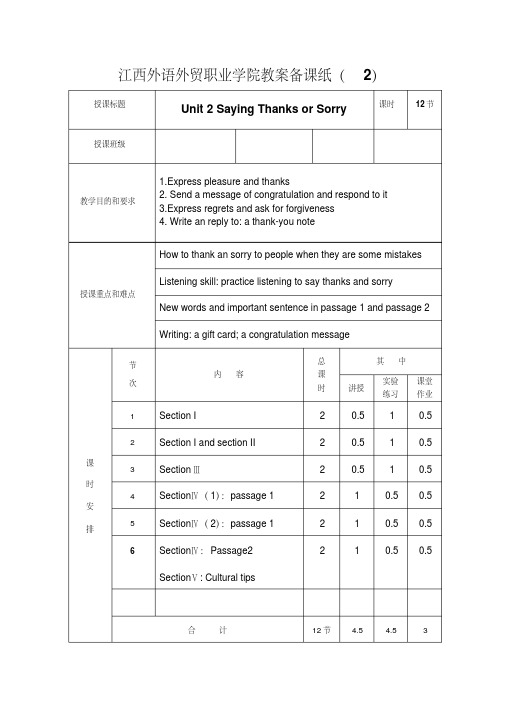
教学方法
Lecture; Act out in groups;
作业布置 Get more familiar with those useful expressions
课堂小结
课堂 效果 分析
及 改进 措施
主任审阅 ____________________ 年 月日
授课教师 ____________________ 年月日
江西外语外贸职业学院教案备课纸( 2)
授课标题
Unit 2 Saying Thanks or Sorry
课时
12 节
授课班级
教学目的和要求
1.Express pleasure and thanks 2. Send a message of congratulation and respond to it 3.Express regrets and ask for forgiveness 4. Write an reply to: a thank-you note
etc. Congratulation cards are also exchanged on holidays. The language used in a
congratulation card usually sounds courteous and complimentary. The following
2
1
Байду номын сангаас0.5 0.5
SectionⅣ( 2):passage 1
2
1
0.5 0.5
SectionⅣ: Passage2
2
1
0.5 0.5
SectionⅤ: Cultural tips
新编实用英语综合教程2第四版-ppt课件
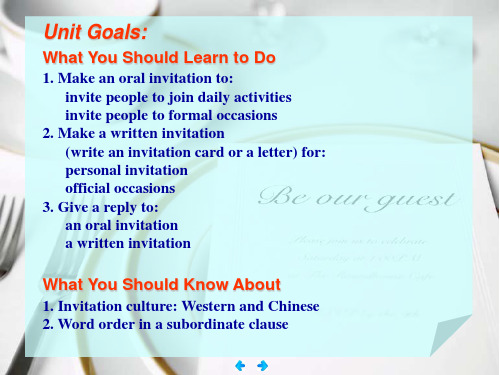
2) Inviting friends to a dinner Mary: We’d love to have you over for dinner Saturday.
Robert: Oh, thank you. What time should I come? Mary: How about eight o’clock?
Following Sample Dialogues Imitate and Perform
Putting Language to Use
Speak and Complete Speak and Translate Speak and Communicate
Unit | One
SECTION I Talking Face to Face
Unit | One
Section I Talking Face to Face
Imitating Mini-talks
Speak and Recite
Acting out the Tasks
Studying Invitation Cards and Letters
Speak and Perform Study and Imitate
it some other time if it is convenient. Chang: What about Saturday? But I need to alert you that the coach will leave
quite early at 7 o’clock. Smith: I’ll ask Mr. Johnson if he has any plans, but I think it’ll be all right.
新编实用英语2第四版Unit--two--Communication-by-email

describe the Internet addicts.
Let me have a guess. Does it mean “talk to you later”?
Back
Mike: That’s right. You are really smart.
Unit | Two
2) New Slang Joins Campus Internet Talk
Li Li: Anything interesting in the paper today?
“bye for now”; “BS” means “big smile”; “FTTB” means “for the time being”; and so on.
Li Hong: Oh, I see. How interesting! Now I can guess what these abbreviations might mean.
“GNBLFY” he used. Mike: Neither do I. Let’s make a guess. Hilary: Mm, let me see. Oh, it might mean “got nothing but love for you”.
2) Talking about cyber slang used in e-mails May: Hi, Susan! I am reading an e-mail from Tom.
Paul: Let me have a look. Well, there is one article about new slang.
Li Li: Really? What does it say?
Paul: New slang has been invented in recent years by students, especially as they
新编实用英语2第四版Unit_1_Invitation_Etiquette
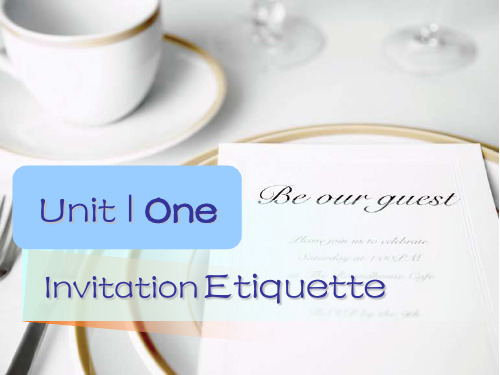
好极了
祝贺
滑旱冰
精品课件
Back
Unit | One
Acting out the Tasks
Speak and Perform
weekend. Molly: Oh, why not? 4) Declining an invitation to go roller-skating Mike: Would you like to go roller-skating with me this Saturday afternoon? Sarah: Saturday afternoon? I’m afraid I won’t be able to. Mike: What about Sunday afternoon? Sarah: That would be nice. 5) Declining an invitation to go out to dinner Steve: Well, thank goodness it’s Friday, Jean. Cindy: Yes, it was a long week, Ken. Steve: Would you like to go out to dinner tonight? I’d like to take you somewhere
2 Work in pairs and act out the tasks by following the above mini-talation (write an invitation card or a letter) for: personal invitation official occasions
新编实用英语2第四版Unit six Shopping and Sightseeing
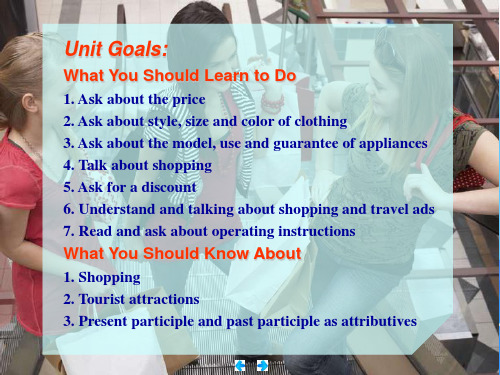
Peter: Me too. I love the galleries in London, but I like the ones in Paris even
more.
Back
Putting Language to Use
Speak and Complete
5 Imagine you are buying a cassette recorder. Complete the following conversation with the shop assistant by filling in the blanks.
You: About one hundred dollars, I think. Shop assistant: If so, I’ll show you a very good cassette recorder on sale.
Being All Ears
Section Ⅲ
Contents
Section Ⅴ
Appreciating Culture Tips
Section Ⅳ
Maintaining a Sharp Eye
Trying Your Hand
Section Ⅰ Talking Face to Face
Imitating Mini-talks
Speak and Complete Speak and Translate Speak and Communicate
SECTION I Talking Face to Face
Imitating Mini-talks
Speak and Recite
1 Work in pairs. Look at the picture and recite the following mini-talks for shopping and sightseeing.
